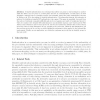Free Online Productivity Tools
i2Speak
i2Symbol
i2OCR
iTex2Img
iWeb2Print
iWeb2Shot
i2Type
iPdf2Split
iPdf2Merge
i2Bopomofo
i2Arabic
i2Style
i2Image
i2PDF
iLatex2Rtf
Sci2ools
129
click to vote
CISC
2007
Springer
2007
Springer
Deniable Authentication on the Internet
Deniable authentication is a technique that allows one party to send messages to another while the latter can not prove to a third party the fact of communication. In this paper, we first formalize a natural notion of deniable security and naturally extend the basic authenticator theorem by Bellare et al. [2] to the setting of deniable authentication. Of independent interest, this extension is achieved by defining a deniable MT-authenticator via a game. This game is essentially borrowed from the notion of universal composition [8] although we do not assume any result or background about it. Then we construct two deniable MT-authenticators: uncontrollable random oracle based and the PKI based, both of which are just 3-round protocols. The second construction assumes the receiver owns a secret key. Such a setup assumption is very popular in the real world. (Without this assumption), all the previous protocols do not have a widely satisfiable performance when applied in the Internet-li...
Basic Authenticator Theorem | CISC 2007 | Cryptology | Deniable Authentication | Deniable Mt-authenticators |
Related Content
| Added | 07 Jun 2010 |
| Updated | 07 Jun 2010 |
| Type | Conference |
| Year | 2007 |
| Where | CISC |
| Authors | Shaoquan Jiang |
Comments (0)

